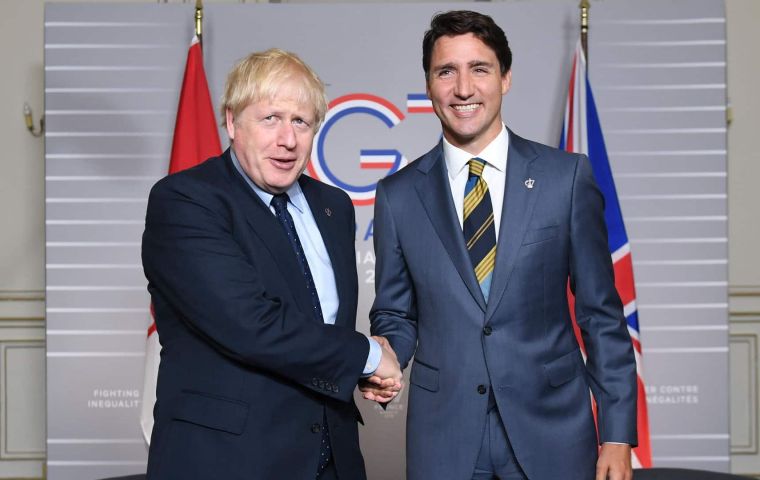MercoPress. South Atlantic News Agency
Britain and Canada announce a new trade deal, the new formal pact will be negotiated next year
 Prime Minister Justin Trudeau and his British counterpart, Boris Johnson, announced the deal during a live video news conference on Saturday morning.
Prime Minister Justin Trudeau and his British counterpart, Boris Johnson, announced the deal during a live video news conference on Saturday morning. Canada and Britain have struck a new trade deal, beating the Dec. 31 Brexit deadline that would have triggered new tariffs on a range of Canadian exports. The interim deal will replace Canada’s current agreement with Britain under the European Union that currently covers trade between the two countries until a new formal pact can be negotiated in the coming year.
Prime Minister Justin Trudeau and his British counterpart, Boris Johnson, announced the deal during a live video news conference on Saturday morning.
“This is a good moment,” Trudeau said, dubbing the deal the Canada-U.K. Trade Continuity Agreement. Johnson said the deal would help both countries to rebuild their economies after the COVID-19 pandemic.
Britain’s decision to leave the EU after its Brexit referendum means that the Comprehensive Economic and Trade Agreement, or CETA, will no longer apply to the country at the end of the year.
The new deal preserves CETA’s key provision until a more comprehensive agreement can be reached later: the elimination of tariffs on 98% of Canadian exports to Britain, which is Canada’s fifth largest trading partner with US$ 29 billion in two-way merchandise trade in 2019.
International Trade Minister Mary Ng said legislation would be introduced in Parliament soon so the interim deal could be ratified. Ng noted that Canada did not give Britain any additional market access to British cheese, preserving the status quo of the country’s supply management system.
Canada’s dairy industry has complained loudly in the past about the additional foreign access to the Canadian market under previous trade deals, including CETA and the new Canada-United States-Mexico Agreement.
Ng and her British counterpart, Liz Truss, committed to negotiating a new and more comprehensive agreement in the coming year.
But few details were known about the current interim agreement. Breaking with past practice during trade negotiations, there were no pre-announcement briefings for journalists and no text was released.
Canada’s business community offered a mixed reaction shortly after the deal was announced, welcoming the economic certainty the interim deal offered while asking for more specifics on the arrangement.
“We call on the Canadian and British government to publish details of the agreement so that businesses can understand all the practical details,” said Mark Agnew, the international policy director for the Canadian Chamber of Commerce.
“We also call on the government and parliamentarians to work together in ensuring a prompt passage of the necessary implementing legislation to provide certainty for Canadian businesses at the earliest possible opportunity.”
Dan Darling, president of the Canadian Agri-Food Trade Alliance, described the “transitional agreement as a welcome stop gap measure but said it is not enough.”




Top Comments
Disclaimer & comment rulesCommenting for this story is now closed.
If you have a Facebook account, become a fan and comment on our Facebook Page!